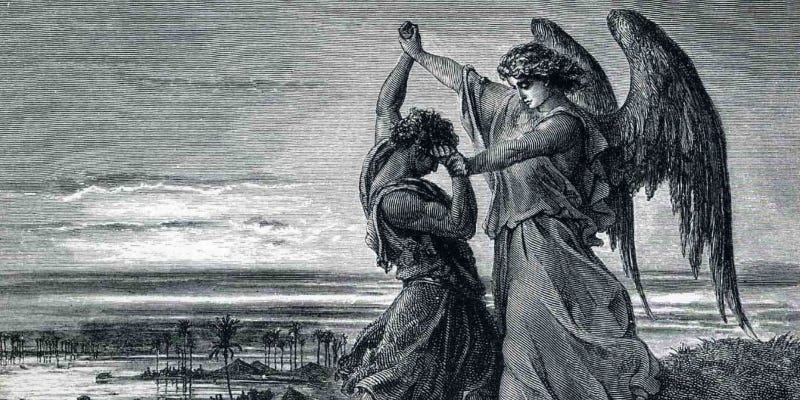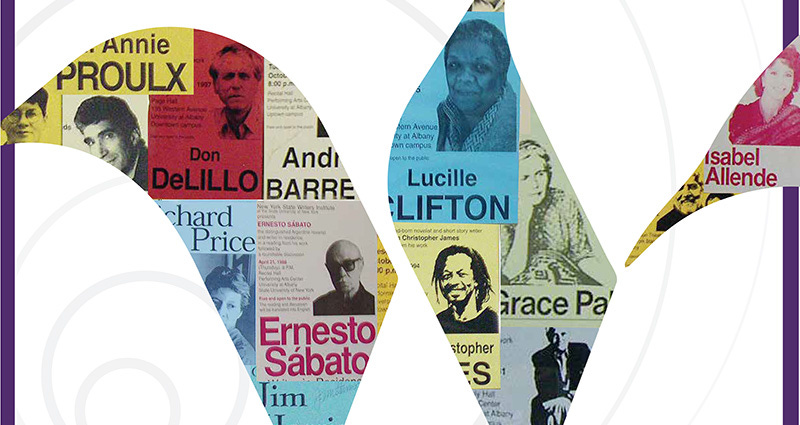Greetings from The Cosmic Library, the podcast about massive books of infinity, night, and dreams.
Here, I look at the podcast-bookshelf we’ve created so far: four seasons (of five episodes each) following tangents from and back into Finnegans Wake, 1,001 Nights, the Hebrew Bible, and Journey to the West. We’re guided by guests including theoretical physicist Jim Al-Khalili, poet and critic Elisa Gabbert, novelist Joshua Cohen, New Yorker critic Katy Waldman, sleep specialist Jade Wu, science journalist Alok Jha, poet Peter Cole, actor-director Olwen Fouéré, and many more.
I think of each miniseries as a sonic, digressive book. And here’s the sonic bookshelf (findable—and totally for free!—wherever you go for podcasts, or over at our home at Lit Hub):
Season 1: Finnegan and Friends
This is the Finnegans Wake season, our first miniseries, before the show had grown into its “Cosmic Library” title. You’ll hear Joseph Nugent, a Joyce scholar, say:
Beckett has a great line, and I'm sure somebody else will have quoted it to you . . . Finnegans Wake isn’t about anything, it's just the thing itself. And to look for a plot in it, certainly in the conventional sense of what a plot meant, would be kind of foolish. But we do know that there are events being described, and the magic of Joyce is that those events and very particularly the specific event that took place in the Phoenix Park—that it happens that my group has been reading about over the last couple of meetings—that event is presented multiple times, in multiple types of language, from multiple directions. But the reality of it: never specified.
And as soon as one starts reading the book, one wants to know more about this and to know more about all of these characters. So we're driven by curiosity, we're driven by curiosity about the events being described. That's for sure. But if we come looking for a plot, of course we're going to be disappointed. That's not necessary. But there is action. Things are happening. Quite what they are, I'm not sure, but I'm damned if I give up trying to find out.
Season 2: The Worlds of Scheherazade
Here’s our 1,001 Nights season, in which Yasmine Seale, translator of 1,001 Nights, says:
Formula is essential to the work. It draws its force from accumulation. It draws its meaning from pattern . . . And I’m trying to think of this in terms of architecture or art. Patterns are not a problem if they’re beautiful to look at. I’m trying to think of pattern as having a literary value that is not simply saying something again, but every time you say something, it takes on a different kind of force and inflects what has been said before. It’s also a kind of spell.
Season 3: Mosaic Mosaic
In our Hebrew Bible season, we check back in with the novelist Joshua Cohen, who says of the Bible’s narratives, its voices:
You slowly have this almost beginning sense that a human is slowly becoming comfortable with the idea of a book written by another human. We have the prophets who, to listen to them, you must accept that the bat kol, the divine voice, is speaking through them—so even though there are humans who are moving their mouths, the words that are emanating are the divine spirit or divinely inspired—texts that are written by or generated by groups, and then individuals.
And I think that this the slow push from collective authorship to the hell we live in today of the individual author. It's that fundamental, really. It's a justificatory crisis of, you know, why are these words here? Whose authority certifies these words? What is the reason why we should hearken unto them?
Season 4: The Hall of the Monkey King
Our most recent season goes into Journey to the West, the classic novel that follows a mischievous anti-hero’s adventure through Chinese spiritual traditions. Translator Julia Lovell says, of that mischievous Monkey King:
Running through Monkey’s actions and personality is a love of this thing called play. He’s an incredibly playful character. And I don’t think it’s a coincidence that the Chinese word in the title of the novel that is translated as “journey”—”you”—can also be translated as “play.”
But Wait, There’s More
Our related show, The Writers Institute, recently had its full first season aired on public radio, but this show too can be heard wherever you go for podcasts. The Writers Institute has the same producer/host as The Cosmic Library, and guests include William Kennedy, Susan Choi, Jonathan Franzen, Saeed Jones, Amelia Gray, and Jonathan Lethem. You’ll also hear Don DeLillo, Ann Beattie, Samuel Delany, Denis Johnson, and Margaret Atwood.
Imagine walking up travertine steps into a wood-paneled university auditorium, full of people taking off their coats, looking over programs, reading books by the author about to be interviewed. Then somebody walks up to the stage and introduces the author, and at this point you realize you’re going to witness a writer inventing something. The Writers Institute is the podcast obsessed with those moments.
-Adam Colman








